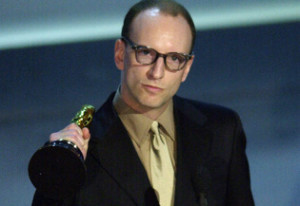Blog in Progress: Artist Appreciation

On a Sunday night in March of 2001, I watched the Academy Awards telecast alone in my apartment. I had a first novel that I’d been unsuccessfully shopping around to agents for the past two years; I’d started entering it in a few small press contests as well. In five months I would learn that I’d won one of those contests, but I didn’t know it on that Oscars night. All I knew was that I spent a lot of time alone in my apartment and had little tangible success to show for it. I’d been thinking, lately, that if I couldn’t publish my book I might give up writing altogether.
I’ve watched the Oscars every year since I was a kid, but I’d always watched for the glamour, the fashion, the celebrity sightings. It was a fun diversion, and I expected no more on that night in 2001. And then, Steven Soderbergh won as Best Director for the film Traffic, and his speech included these two sentences:
“What I want to say is – I want to thank anyone who spends part of their day creating. I don’t care if it’s a book, a film, a painting, a dance, a piece of theater, a piece of music… anybody who spends part of their day sharing their experience with us. I think this world would be unlivable without art, and I thank you.”
What he said – not just the content, but the clearly heartfelt delivery – made me cry. Hard. I felt like he was talking directly to me, and I sat on my couch in front on my TV, sobbing. Steven Soderbergh was telling me, Lisa Borders, the unpublished novelist, that what I did mattered.
It sounds silly, I know, but something changed in me that night. And it wasn’t about perspective, that he’d made me see the act of creating as more valuable than the finished product; it was about connection. I realized that there were people out there who actually cared whether people like me made art. And by “people like me,” I mean people coming from circumstances where art was seen at best to be a frivolous diversion – a pursuit of the wealthy, not something the rest of us could reasonably expect to do.
Everyone in the arts knows how difficult it is to make a living as any kind of artist in this country, and of the necessity for either family money, a generous grant, a well-employed spouse or a day job. But equally important – and less acknowledged, I think – is the need for emotional support.
I’ve been thinking about this a lot over the past week, as my second novel went forth into the world. Newtonville Books was packed on the night of my launch reading; many of the people there were familiar faces from Grub Street, an organization I think of as my home, my family. It was immensely touching and gratifying, the support and love I felt that night, and have continued to feel over the past week. But I didn’t always have this level of support, and my mind keeps drifting to those who might not.
We have Grub here in Boston, and people in cities like New York and Minneapolis have access to organizations like Sackett Street Writers and The Loft; but how does a writer, sculptor, or dancer in rural Texas, the vast coal-mined stretches of Pennsylvania, or a working class town in New Jersey find someone to say, “Thank you for making art?”
Recently my boyfriend relayed to me a conversation he had with his teenage niece, who is equally interested in – and equally good at – art and math. He gave her pragmatic, loving advice about the difficulty making a life as an artist and the need for a bread-and-butter career. Jeff is an artist himself, and, as he put it to me, has “first-hand knowledge about how much the profession can kick you around.”
He wasn’t dissuading her from art, but wanted her to know what she would be getting into if she pursued it. I can’t argue that anything he said to her was wrong, or that it wasn’t good advice, but his words stung me, and it took some time to figure out why.
It was simply this: I think the world needs more artists, not less. We especially need his niece’s art, and it’s needed precisely because hers is the voice that may not be strongly encouraged. That doesn’t mean she shouldn’t listen to her uncle’s sound advice. She must be able to support herself. But I also think she shouldn’t give up on her art.
I want to say to her, and to everyone like her, what Steven Soderbergh said that night twelve years ago: thank you for making art. If that’s you, reading this, feeling alone and wondering if you should keep at it: Thank you. If you’re feeling like you’re working in a vacuum, wondering if anyone cares: I care. And if you’re suffering a lack of encouragement from your family, your community, keep at it even more, for yours is the kind of voice I want to read, the kind of art I want to see. What you’re doing is not “a delusion, an unfortunate habit,” as Lorrie Moore jokingly wrote in a short story called “How to Become a Writer” – a story I reread at least once a year, because it makes me feel less alone.
What you’re doing, no matter how raw in form, is art. And it matters.
Tweet



